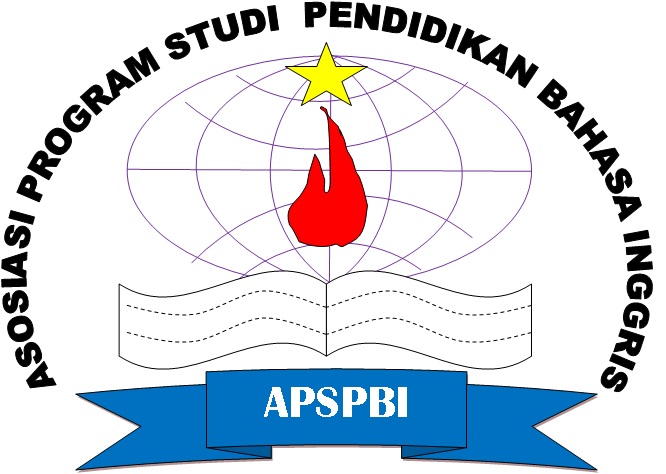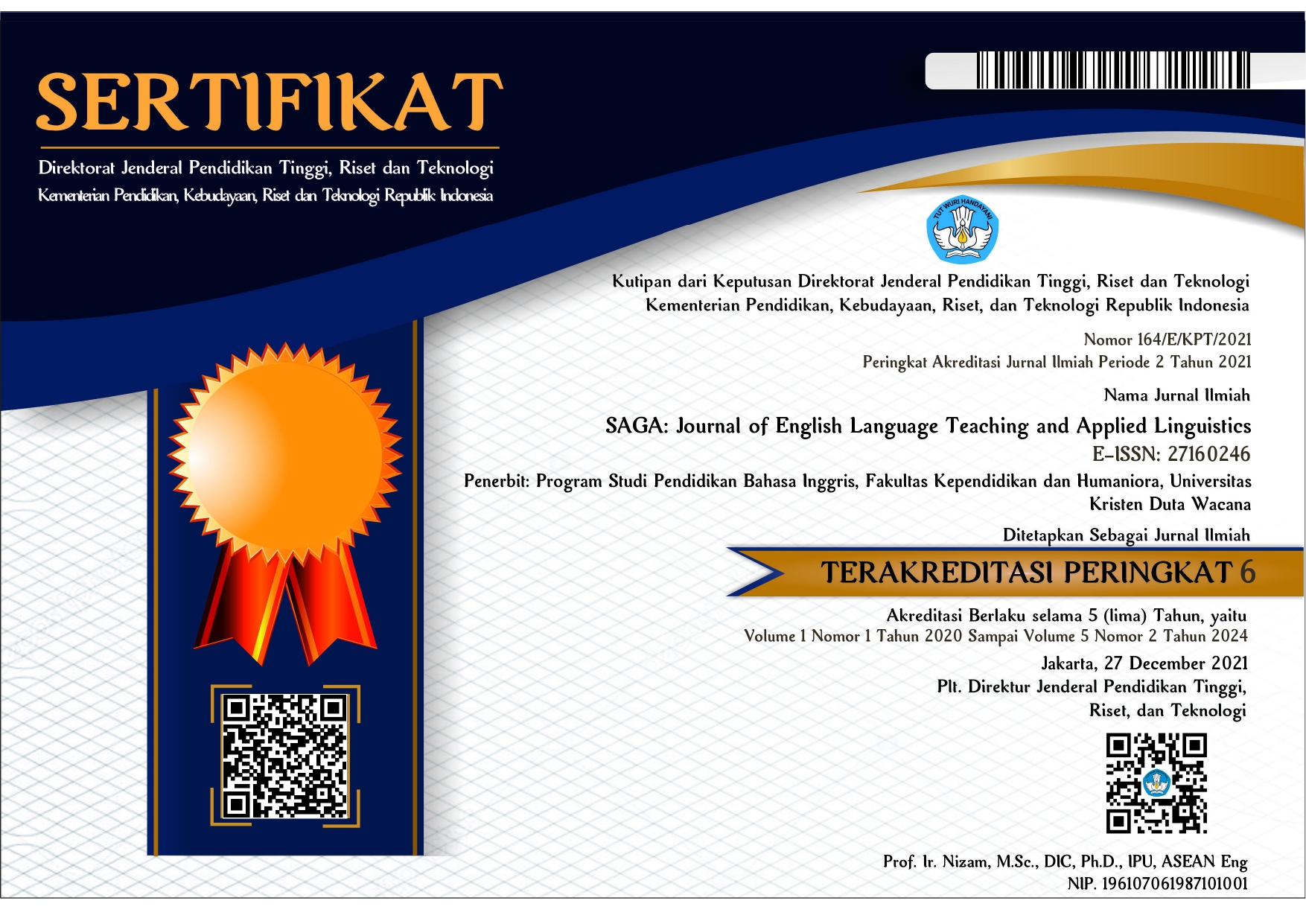The Plagiarism Awareness of University’s Students in Writing Research Proposal
DOI:
https://doi.org/10.21460/saga.2023.42.150Keywords:
Plagiarism, Awareness, Proposal WritingAbstract
This study aimed to investigate the students' understanding and awareness of plagiarism in writing proposal. This study also investigated their reasons doing plagiarism in academic writing. A qualitative research method was used in this study by using interview for data collection techniques based on phenomenological research. The participants of this study were four students in the sixth semester in the English department at one of public universities in Banjarmasin. The study showed that students were aware of the act of plagiarism. They did plagiarism because of several factors, namely, laziness, wanting to finish quickly, and being pressured by circumstances. The study concluded that students needed to warn from the beginning related to the cause and impact of plagiarism for their future career. It`s not only bad for themselves but also harm others. The students should be actively involved in writing classes to express their own ideas and it can help them in proposal writing.
References
Dwi, I., Santosa, M., H., & Paramartha, A. (2020). A study of indonesian lecturers' perception on student plagiarism. SAGA: Journal of English Language Teaching and Applied Linguistics, 1(2), 81-94.
Hizriani, N., Khairatunnisa, K., Nor, H., & Handrianto, C. (2022). Online and offline students’ presentation in thesis proposal: Challenges and solution. Randwick International of Social Science Journal, 3(3), 549-560.
Ibegbulam, I., J., & Eze, J., U. (2015). A case study: Nigerian students' knowledge, perception, and attitude to plagiarism. IFLA Journal, 41(2), 120-128.
Idiegbeyan-Ose, J., Nkiko, C., & Osinulu, I. (2016). Awareness and perception of plagiarism of postgraduate students in selected universities in Ogun state, Nigeria. Library Philosophy and Practice.
Jereb, E., Urh, M., Jerebic, J., & Šprajc, P. (2017). Gender differences and the awareness of plagiarism in higher education. Social Psychology of Education, 21(2), 409–426. https://doi.org/10.1007/s11218-017-9421-y
Kurambayev, B. (2020). The causes and consequences of plagiarism by journalists in Central Asia. Asian Studies Review, 44(4), 691-708.
Mahmud, S., Bretag, T., & Foltýnek, T. (2019). Students’ perceptions of plagiarism policy in higher education: A comparison of the United Kingdom, Czechia, Poland and Romania. Journal of Academic Ethics, 17, 271-289.
Najwan, A., A., Zahra, A., Firdaus, A. S., Lapuja, S., Mahrita, Y., Saper, M. N., & Handrianto, C. (2022). Autonomous learning strategy to improve learners’ writing skills on package c program in PKBM Barito Banjarmasin. Jurnal Pendidikan dan Pemberdayaan Masyarakat (JPPM), 9(2), 122-129.
Peterson, J. S. (2019). Presenting a qualitative study: A reviewer’s perspective. Gifted Child Quarterly, 63(3), 147-158.
Prahmana, R. C. I. (2017). The role of research-based learning to enhance students’ research and academic writing skills. Journal of Education and Learning (EduLearn), 11(3), 351-366.
Rahman, M. A., Melliyani, M., Handrianto, C., Erma, E., & Rasool, S. (2022). Prospect and promise in integrating multi-literacy pedagogy in the English language classroom in Indonesia. ETERNAL (English, Teaching, Learning, and Research Journal), 8(1), 34-52.
Santosa, M. H., Paramartha, A. G. Y., & Absari, R. M. (2019). Indonesian English university students' perception of plagiarism in an online world. Journal of ELT Research: The Academic Journal of Studies in English Language Teaching and Learning, 100-114. https://doi.org/10.22236/JER_Vol4Issue2pp100-114
Selemani, A., Chawinga, W. D., & Dube, G. (2018). Why do postgraduate students commit plagiarism? An empirical study. International Journal for Educational Integrity, 14(1), 1-15.
Serang, J., Banseng, S., & Handrianto, C. (2022). The effect of mind maps in Malay language essays. International Journal of Educational Dynamics, 5(1), 16-23.
Simatupang, M. S., Peter, R., Murniarti, E., Male, H., & Tambunsaribu, G. (2021). The plagiarism tendency during covid-19 pandemic. Turkish Journal of Computer and Mathematics Education, 12(14), 4600-4607.
Subekti, A. S. (2022). Teaching indonesian L2 learners academic writing: A proposed instructional model. SAGA: Journal of English Language Teaching and Applied Linguistics, 3(2), 91-102.
Suherdi, D., Kurniawan, E., & Lubis, A. H. (2020). A genre analysis of research article ‘findings and discussion’ sections written by Indonesian undergraduate EFL students. Indonesian Journal of Applied Linguistics, 10(1), 59-72.
Suwita, F. S. (2020). Pengembangan sistem informasi tugas akhir dan skripsi (SIMITA) di universitas komputer Indonesia (UNIKOM). Jurnal Teknologi dan Informasi, 10(1), 71-82. https://doi.org/10.34010/jati.v10i1.2861
Ukpebor, C. O., & Ogbebor, A. (2013). Internet and plagiarism: Awareness, attitude and perception of students of secondary schools. International Research: Journal of Library and Information Science, 3(2).
Vanbaelen, R., & Harrison, J. (2013, July). Plagiarism awareness. IEEE International Professional Communication 2013 Conference (pp. 1-8). IEEE.
Wijaya, K. (2022). English education master students’ perceptions on developing critical thinking skills in academic writing. SAGA: Journal of English Language Teaching and Applied Linguistics, 3(2), 125-136.
















